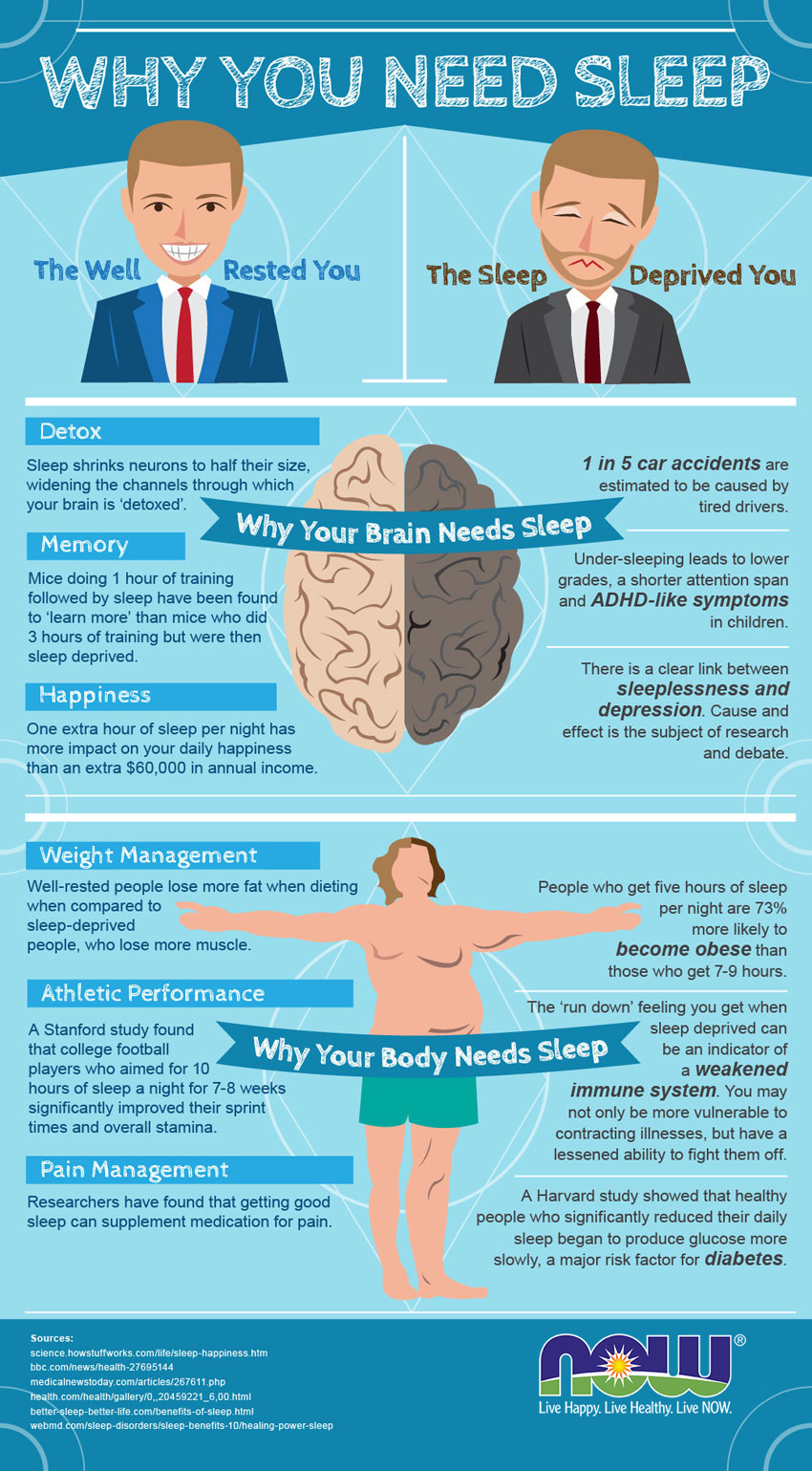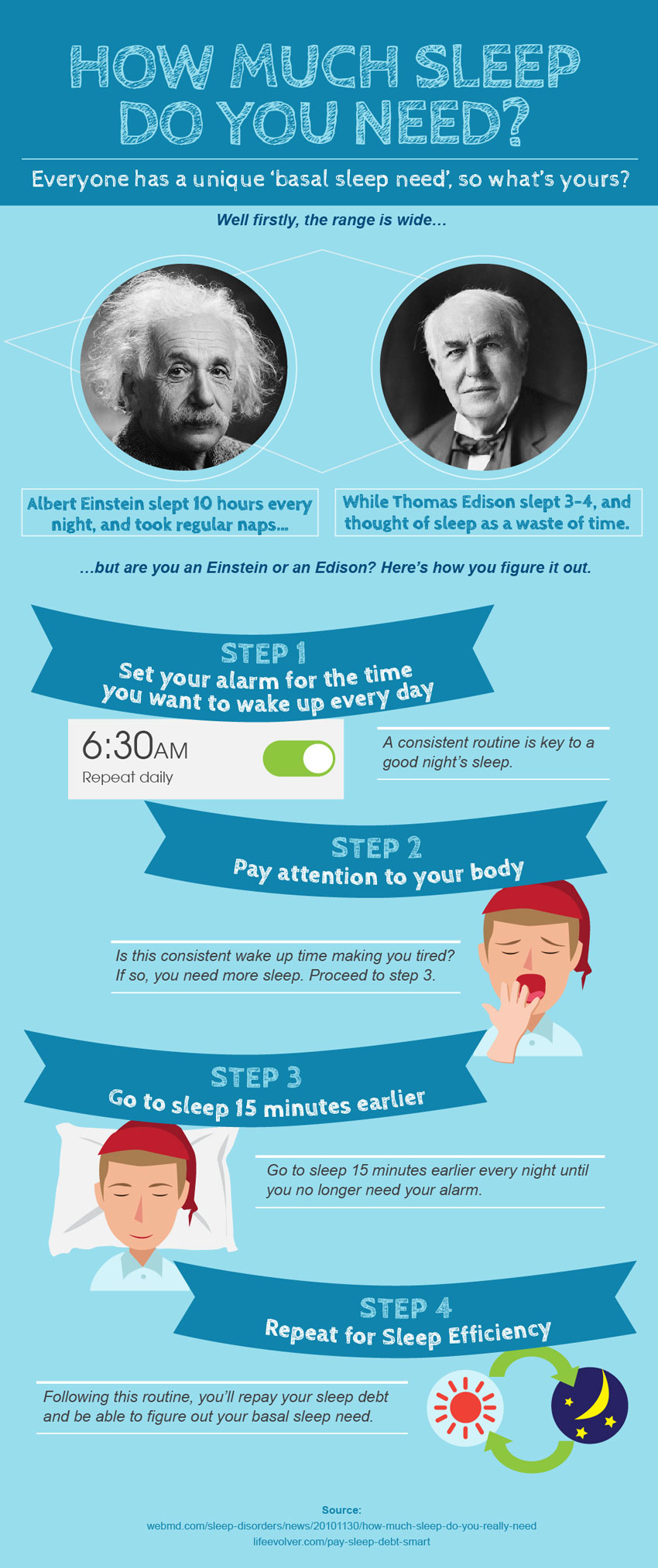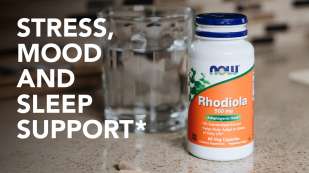Use coupon code RESCUE with your purchase of $60 or more for a free†
Hydration Rescue CapsulesHow to Sleep Better at Night
No one really knows why we sleep. From a health standpoint, only your brain seems to experience a real difference between sleeping and resting- your muscles get rejuvenated just as well sitting as they do sleeping.
But while we don’t know WHY exactly we sleep, we do know the benefits of solid sleep, plus the consequences of a poor sleep schedule. Using this information, and existing research on the stages of sleep, we’ve built a guide to help you learn how to sleep better at night. With these tips for better sleep, you’ll be catching z’s in no time.
The Consequences of Sleep Deprivation
The Benefits of Sleep

Why You Need Sleep
The Well Rested You
– Illustration of smiling man (Left Side)
The Sleep Deprived You
– Illustration of frowning man (Right Side) )
Why your Brain Needs Sleep
– Illustration of brain. Left side pink, right side dark grey. )
Left Side:
Detox:
Sleep shrinks neurons to half their size, widening the channels through with your brain is “detoxed”.
Memory:
Mice doing 1 hour of training followed by sleep have been found to 'learn more' than mice who did 3 hours of training but were then sleep deprived.
Happiness:
One extra hour of sleep per night has more impact on your daily happiness than an extra $60,000 in annual income.
Right Side:
1 in 5 car accidents are estimated to be caused by tired drivers.
Under-sleeping leads to lower grades, a shorter attention span and ADHD-like symptoms in children.
There is a clear link between sleeplessness and depression. Cause and effect is the subject of research and debate.
Why Your Body Needs Sleep
– Illustration of man’s body, Left side slim, right side overweight
Left Side:
Weight Management:
Well-rested people lose more fat when dieting when compared to sleep-deprived people, who lose more muscle.
Athletic Performance:
A Stanford study found that college football players who aimed for 10 hours of sleep a night for 7-8 weeks significantly improved their sprint times and overall stamina.
Pain Management:
Researchers have found that getting good sleep can supplement medication for pain.
Right Side:
People who get five hours of sleep per night are 73% more likely to become obese than those who get 7-9 hours.
The 'run down' feeling you get when sleep deprived can be an indicator of a weakened immune system. You may not only be more vulnerable to contracting illnesses, but have a lessened ability to fight them off.
A Harvard study showed that healthy people who significantly reduced their daily sleep began to produce glucose more slowly, a major risk factor for diabetes.
Sources:
science.howstuffworks.com/life/sleep-happiness.htm
bbc.com/news/health-27695144
medicalnewstoday.com/articles/267611.php
health.com/health/gallery/0,,20459221_6,00.html
better-sleep-better-life.com/benefits-of-sleep.html
webmd.com/sleep-disorders/sleep-benefits-10/healing-power-sleep
NOW Logo
The reasons your brain and your body need plenty of sleep. Besides giving you a well-rested feeling, sleep has many different benefits for both your body and your mind:
- Detoxes your brain: Sleep makes it possible for your brain to effectively dispose of the waste that your brain cells have produced throughout the day by shrinking neurons to half their size, making the channels that the waste moves through wider, and allowing the waste to be expelled to the liver twice as fast.
- Memory consolidation: While you sleep, the brain repeatedly replays remembered events from that day; if these phases are interrupted, memories aren’t fully formed, or even not formed at all. This is part of what helps you learn new skills. One study found that mice doing an hour’s training followed by sleep would ‘learn more’ than mice who did three hours of training but were then sleep deprived. This process is the result of connections forming between neurons, which happens more often during sleep.
- Improved athletic performance: A study from Stanford found that college football players who aimed for 10 hours of sleep a night for 7-8 weeks saw significant improvement in their average sprint times and overall stamina; they also experienced a drop in daytime tiredness.
- Improved weight loss: Sleep and metabolism are controlled by the same parts of the brain, and studies of sleep among people on diets have found that well-rested test subjects lose more weight in fat than those who were sleep deprived, who then lost more weight in muscle mass. Participants also reported more hunger when they got less sleep.
- Better mood: Could it be better for you to sleep in a little instead of be the first one to the office at 7 am? Research shows that getting one extra hour of sleep a night has more impact on your daily happiness than $60,000 more in annual income.
- More manageable pain: Research shows that sleep can reduce chronic pain in people just as much as medication would.
The Consequences of Sleep Deprivation
While sleep can improve your life significantly, a lack of sleep can have several undesirable consequences, and unfortunately, 40% of Americans get seven hours of sleep or less per night. Besides the obvious feelings of fatigue and grogginess that accompany a sleepless night, not getting enough sleep can have several negative effects on you.
- Heightened risk of car accidents: Fatigue is consistently high on the list of causes for single-car run-off-road accidents, according to the National Highway Traffic Safety Administration- often higher than alcohol.
- Lower grades: Studies of children and college students have shown that students who don’t sleep enough have lower grades than students who regularly sleep an uninterrupted full night.
- Shorter attention span: In young children especially, people may become hyperactive when they get less than eight hours of sleep per night, showing almost ADHD-like symptoms and a shorter attention span.
- Obesity: People who get five hours of sleep per night are 73% more likely to become obese than people sleeping 7-9 hours per night, and in children, the amount of sleep they get is the number one factor in determining their risk of childhood obesity. These correlations might be linked to low levels of leptin, a hormone that reduces hunger.
- Risk of cold and flu: When you’re sleep deprived and feeling rundown, that exhausted feeling may indicate a weakened immune system and a higher vulnerability to contracting illnesses. You’re also less able to fight off sickness, and research shows that consistent sleep deprivation might even lessen the effectiveness of vaccines.
- Increased risk of diabetes: According to a Harvard study, healthy people who reduced their daily sleep from eight to four hours began to produce glucose more slowly than when they got a good night’s sleep, which is a major risk factor for diabetes.
- Mood disorders: “Waking up on the wrong side of the bed” is often offered as a reason for grumpiness, but consistent sleep deprivation over long periods of time may cause or worsen mood disorders such as depression and anxiety.
The Stages of Sleep

Now that you know the why’s behind the importance of good sleep, it’s time to dive in to the how. The sleep stages can be divided into two phases, each with their own stages: Non-Rapid Eye Movement, and Rapid Eye Movement.
Non-Rapid Eye Movement (NREM)
Stage 1: Your brain activity decreases from its stage of wakefulness, and you can still be awakened without difficulty. The feeling of falling (officially named hypnic myoclonia) is most commonly experienced during this stage, and the stage usually lasts 5-10 minutes.
Stage 2: Periods of muscle tone mix with periods of muscle relaxation, and your body temperature decreases and heart rate slows in preparation for deep sleep.
Stages 3 and 4: You enter a deep sleep, and your body begins a variety of rebuilding processes: tissue regeneration, building of bone and muscle, and strengthening of your immune system. As you age, your deep sleep stages get shorter and shorter. Stages 3 and 4 display similar effects, with 4 being more intense.
Rapid Eye Movement (REM)
REM sleep occurs after the fourth stage of NREM sleep, with the first stage occurring about 90 minutes after you first fall asleep. The first period of REM lasts around ten minutes, and each stage lengthens until the final stage, which may last as long as an hour. Your brain activity is heightened during REM sleep, and you experience intense dreaming plus periods of muscle paralysis. As you age, you spend less time in REM sleep; adults spend about 20% of their sleep in REM, while infants spend about 50% of sleep in REM.
Note that sleep stages don’t progress linearly. Sleep begins in Stage 1 and moves through 2, 3, and 4; after 4, however your body goes back through Stages 3 and 2 before entering REM sleep. After REM sleep, your body usually returns to Stage 2 sleep, for a total of approximately four or five cycles throughout the night.
How Much Sleep is Enough?
Making it through each sleep stage is crucial to getting high-quality sleep, but exactly how many times do you need to go through the sleep cycle? Many people argue that they get by just fine on very little sleep. However, research shows that only a tiny fraction of people can function well on fewer than eight hours of sleep each night. Sleep expert David Dinges, PhD, estimates that, over the long haul, perhaps one person in a thousand can function effectively on six or fewer hours of sleep per night.

The reality is, each individual person has a different amount of optimal sleep. Sleep experts recommend we get 7-9 hours of sleep each night, though the actual number is different for each of us. Growing children need more sleep than adults, and some people may be genetically predisposed to need less sleep.
Your sleep need varies based on two factors: your basal sleep need and your sleep debt. Your basal sleep need is the base amount of sleep you need to function well, and your sleep debt is the accumulated sleep that is lost by a bad night’s sleep, sickness, staying up late, or other factors.
To determine your sleep needs, one doctor suggests this process: if you need an alarm clock to wake up, go to sleep 15 minutes earlier the next night. If you still need an alarm, push your bedtime up another 15 minutes, and so on until you no longer need an alarm to wake up. This should give you a ballpark idea of how much sleep you need a night.
If you’re getting 7.5 hours of sleep per night or more and you still wake up feeling groggy, it’s time to see a sleep specialist. You may have issues that affect your sleep quality, such as sleep apnea, and need sleep help.
When figuring out how much sleep you need, it’s important to know your sleep debt as well as your basal sleep need. Many people assume that if they lose an hour of sleep, they just need to get an extra hour of sleep the next night; however, you also have to make up for the extra hour that you were awake and your increased activity during this time. Using your basal sleep need as a foundation, you can determine your sleep debt and adjust it based on how tired you feel or how much extra sleep you think you need.
Over the short term, you can settle sleep debt by adding an extra hour or two of sleep per night and/or sleeping in on the weekend until you’ve paid your debt in full. This strategy is ideal for a week when you’re working late nights at work or are staying up late while going out with friends on the weekend.
However, if you’re increasing your sleep debt over a longer period of time- say, if you’ve just had a child and aren’t able to get a full eight hours every night- you can’t easily make it up over just a few nights. In cases like these, it may take a few weeks to really fill your sleep debt. Your best bet is to plan a vacation or stay-cation with a light schedule and no obligations, and then turn off your alarm clock and go to bed and wake up when it feels natural. This will “reset” your sleep system so that while you may be sleeping 12 hours a night at the beginning, you’ll eventually settle back in to the amount that is your basal sleep need.
If you’re experiencing sleep debt, you may be tempted to take a nap as a quick fix; however, this isn’t the ideal solution. Naps can interfere with your ability to fall asleep at night and can further disrupt your sleep schedule; if you absolutely have to nap, keep it to an hour or so during peak sleepiness hours in the afternoon, but keep it short, or else you might not be able to fall asleep that night.
The exception to this rule is new parents who are sleep deprived over a long period of time while also not getting high-quality rest (studies show parents lose about 350 hours of sleep during their baby’s first year). In this case, any sleep you get will become more effective; you’ll be able to fall asleep more quickly and more soundly, and any amount of sleep, from 20 minutes to a couple of hours, will improve your functioning. In fact, your sleep schedule may change to one that is more productive for your current lifestyle, such as segmented sleep or polyphasic sleep as discussed below.
Sleep Smarter
Just as there are different amounts of sleep that work for each individual, there’s also more than one way to sleep. Each different sleep schedule has its own advantages and disadvantages. The trick is finding the one that offers the best productivity and benefits for you so that you learn how to sleep better at night.

Getting Better Sleep

No matter what sleep schedule you follow, you can improve your quality of sleep through practicing certain techniques and tricks, just like any other talent or skill. Since poor sleep is generally caused by short disturbances in sleep, your overall goal should be to eliminate any factors that might interrupt your sleep cycle. Experiment with the tips for better sleep below to see which of them improve your sleep quality.
- Create a relaxation routine: Whether it’s listening to music, reading a book, taking a warm bath, or writing, begin to relax about an hour before bed in order to slow your mind down and prepare for sleep.
- Have your last drink 2-3 hours before bed: While alcohol is a sedative and makes you sleepy initially, it can cause you to wake up as your blood alcohol levels drop later. To avoid this, have your last drink a few hours before you hit the hay. Continue to limit your fluid intake 1-2 hours before bed so that you don’t wake up during the night.
- Avoid electronics in and before bed: Don’t watch television, play on your phone, or use your laptop in bed; even reading in bed should be discouraged. The blue light from your screens emit short-wavelength light that stops the production of melatonin and makes you feel more alert- which is great for the morning, but not so ideal when you’re trying to fall asleep. Also, the more time you spend awake in bed, the harder it is for your body to associate your bed with sleep.
- Sleep without pets: Studies have shown that 53% of people who sleep with their pets report that their pets disturb their sleep.
- Use sleeping aids and devices: Experiment with white noise machines, adjustable beds, sleep masks, and indoor air purifiers if you need help sleeping. White noise machines or noise reducers create ambient or white noise, which makes it more difficult for a sleeper to hear any potentially disruptive noises. Adjustable beds can alleviate pain that can disturb sleep, especially for those suffering from hip and knee pain or acid reflux disease. A sleep mask tricks the brain into falling asleep more quickly for people who need to sleep or nap during daylight, and indoor air purifiers lessen symptoms suffered by those with allergies or nasal congestion.
- Wake up at a regular time daily: Regardless of when you fall asleep, waking up at the same time every day will eventually lead to tiredness at the same time every day, letting sleep come easier. Similarly, only go to sleep when you’re tired. Tossing and turning in bed just because it’s “bedtime” can slow the onset of sleep.
Remember, your sleep schedule is completely unique to your body, mind, and daily schedule. Experiment to find what your personal optimal amount of sleep is, and keep in mind that people sleep differently at different stages of their life, so your sleep schedule is likely to change as you age.
A good night’s sleep is the first step to enjoying many health and psychological benefits, and by sleeping well, you’ll awake ready to tackle the day and live a healthy lifestyle.











